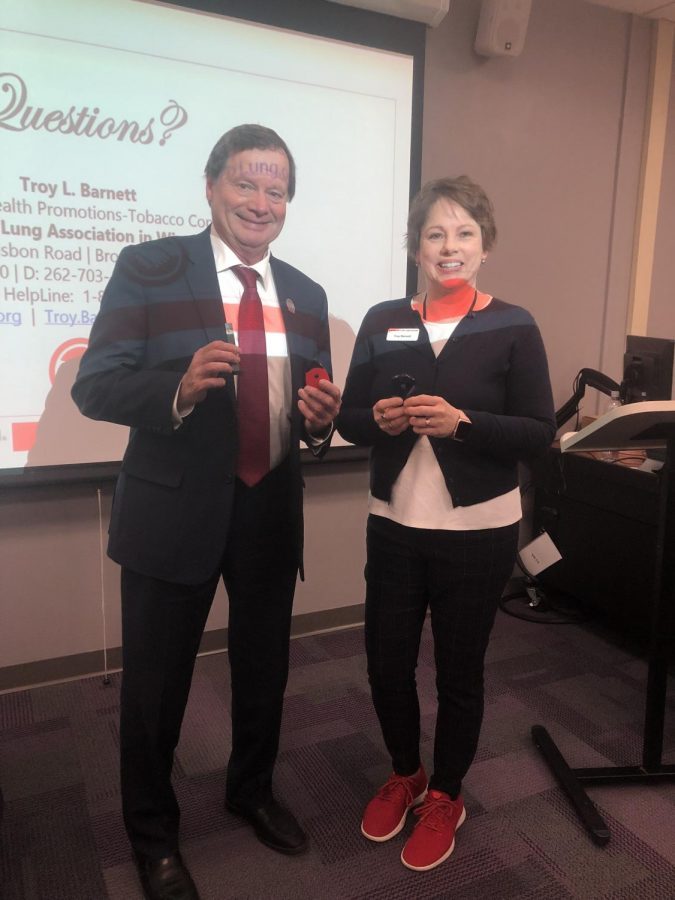Vaping targets younger audience
Campus orgs, American Lung Association hold forum on vape products, tobacco
March 4, 2019
Roughly 30 students, staff and community members attended a forum focused on vaping and the dangers of tobacco use Feb. 19 in Heide Hall.
The forum, “Tomorrow’s Potential Customer”, was sponsored by the University of Wisconsin-Whitewater Communicating Health in Practice (CHIP) and Social Work Student Organization (SWSO), The American Lung Association and their initiative SPARK.
“More than 3,200 people 18 years old and younger will try their first cigarette every day,” said manager for health promotions and tobacco control at Wisconsin’s American Lung Association Troy Barnett. “In 2017-2018 in Wisconsin there has been a 78% increase in e-cigarette use for high-school students and 48% use among middle school students. If these stats aren’t scaring you and making you mad, they should be.”
Throughout her presentation Barnett shared the history of tobacco use, the products currently used, the overall problem and opened up the forum for questions and comments.
Nicholas Surita, a coordinator for the Tobacco Control & Lung Health at the American Lunch Association, co-presented alongside Barnett to share the coalition building that is happening through current projects. Surita introduced the current state-wide initiative, SPARK, that helps college campuses pass tobacco-free policies and educate campus communities on the threat of tobacco and all its forms.
“The solution starts with education, then we can work through and towards policy changes” said Surita. “Currently, there are 31 tobacco free college campuses that have been led through the SPARK initiative. When I learned that UW-W was the recipient of a SPARK grant, I was excited to come and be an advocate on this campus.”
In attendance was Wisconsin state representative Don Vruwink who shared his support and in the SPARK initiative and its presence at UW-W.
“As you change the culture, it is easier to continue the policy because you are encouraging students who want to come to UW-W because it is tobacco-free and want it to stay that way,” said Vruwink.
During the forum, Nicolette Davis a student representative from CHIP personally shared her own her realization on the danger she was imposing on her body through tobacco use. Davis began smoking at the age of 12 and began vaping at the end of middle school and freshman year of high-school.
“Vaping became a huge epidemic because you didn’t go anywhere without it and everyone in high-school had some kind of device. Once I got to college I started using smaller devices like the juul because it was easier to take to classes. But then I started doing some research through involvement with CHIP and realized how addicting vaping was and actually how much nicotine was in one juul,” said Davis. “It kind of freaked me out because I was 20 years old when I found out that I’m pretty much killing my body already with something that is so simple.”
Davis is currently going on one year of being tobacco free and plans on continuing to educate students like her on what they are doing their bodies when they use tobacco.
Other students also shared their fears of the current tobacco and vape trend and hope to see a cultural shift through the work that CHIP and the American Lung Association is doing.
“For me, I didn’t think the problem was that bad until I saw and heard about high-students shutting down without their juuls,” said senior Cierra Brey. “Kids who are our future are addicted to these products and that’s terrifying.”













